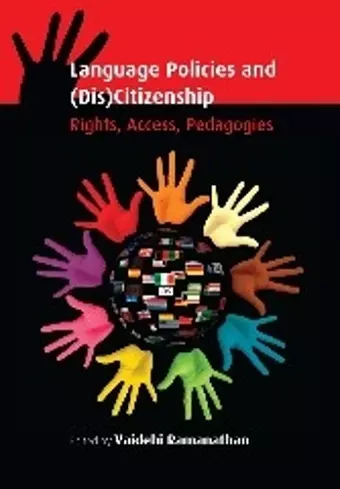Language Policies and (Dis)Citizenship
Rights, Access, Pedagogies
Format:Paperback
Publisher:Channel View Publications Ltd
Published:7th Aug '13
Currently unavailable, and unfortunately no date known when it will be back
This paperback is available in another edition too:
- Hardback£114.95(9781783090198)

This volume explores the concept of 'citizenship', and argues that it should be understood both as a process of becoming and the ability to participate fully, rather than as a status that can be inherited, acquired, or achieved. From a courtroom in Bulawayo to a nursery in Birmingham, the authors use local contexts to foreground how the vulnerable, particularly those from minority language backgrounds, continue to be excluded, whilst offering a powerful demonstration of the potential for change offered by individual agency, resistance and struggle. In addressing questions such as 'under what local conditions does "dis-citizenship" happen?'; 'what role do language policies and pedagogic practices play?' and 'what kinds of margins and borders keep humans from fully participating'? The chapters in this volume shift the debate away from visas and passports to more uncertain and contested spaces of interpretation.
In this thought-provoking volume, Vaidehi Ramanathan and colleagues push forward the boundaries of research on language and citizenship, foregrounding human agency and the situated and processual nature of citizenship. The volume opens with a beautifully written, agenda-setting Introduction by Ramanathan and then, in the chapters that follow, we encounter detailed and illuminating accounts of the ways in which language practices are bound up with situated citizenship processes at work in different social and political contexts.
-- Marilyn Martin-Jones, University of Birmingham, UKCitizenship has become the major bureaucratic mechanism extensively used nowadays to grant and deny basic human rights for education, residence and well being. Whether via language as a condition for reside or visas as the right of children to learn, citizenship has become the controlling device for everyday lives of million of disadvantaged people world wide. In this most stimulating book Professor Vaidehi Ramanathan, along with major distinguished and thoughtful authors, has created a brilliant critical text that documents and analyzes the phenomenon in a multiple range of settings world-wide focusing on ages, pedagogies, policies, languages, gender and access.
-- Elana Shohamy, Tel Aviv University, IsraelThis is an excellent collection of articles, thoughtfully compiled by an insightful and innovative editor. Topics cover a range of important contemporary issues in diverse regions of the world. A significant contribution to applied linguistics.
-- Bonny Norton, Professor and Distinguished University Scholar, University of British Columbia, CanadaThis is an exceptional and refreshing book which presents rigorous and significant research on language policy and citizenship. Authors develop a critical stance to illustrate how the vulnerable continue to be excluded from many institutions while simultaneously offering an uplifting account of how human agency, resistance and struggle can offer vital alternatives. It is relevant to a wide audience and should be compulsory reading for those in the social sciences, education and applied linguistics at both undergraduate and graduate level.
-- Angela Creese, University of Birmingham, UKVaidehi Ramanathan's edited volume is certainly a daring endeavor. Language Policies and (Dis)citizenship yields fascinating findings and opens up an exciting area for research. The book reads equally well as a whole or by chapter. Academics and graduate students will use the book as a source of inspiration for papers and dissertations. Single chapters may be used as reading material for an undergraduate course in sociolinguistics. Most importantly perhaps, language policy makers around the globe would be well-inspired to read Ramanathan's book.
-- Ghislain Potriquet, University of Strasbourg * Linguist List 25.3394 *By investigating the link between (dis)citizenship, globalization and language policies, the volume edited by Ramanathan raises the more general question of the inadequacy of traditional definitions of citizenship to grasp contemporary social reality. It calls to go beyond classical typologies, such as T.H. Marshall’s distinctionbetween civil, social and political citizenship (Marshall 1950) in order to look whether it is actually possible for individuals to exercise citizenship through participation. While the answers given to this question by the different contributors of the volume are primarily empirical, they open nevertheless, a promising new research track for future theoretical investigation.
-- Nuria Garcia, Sciences Po Paris, France * Language Policy (2016) 15 DOI 10.1007/s10993-015-9385ISBN: 9781783090181
Dimensions: 210mm x 148mm x 17mm
Weight: 411g
312 pages